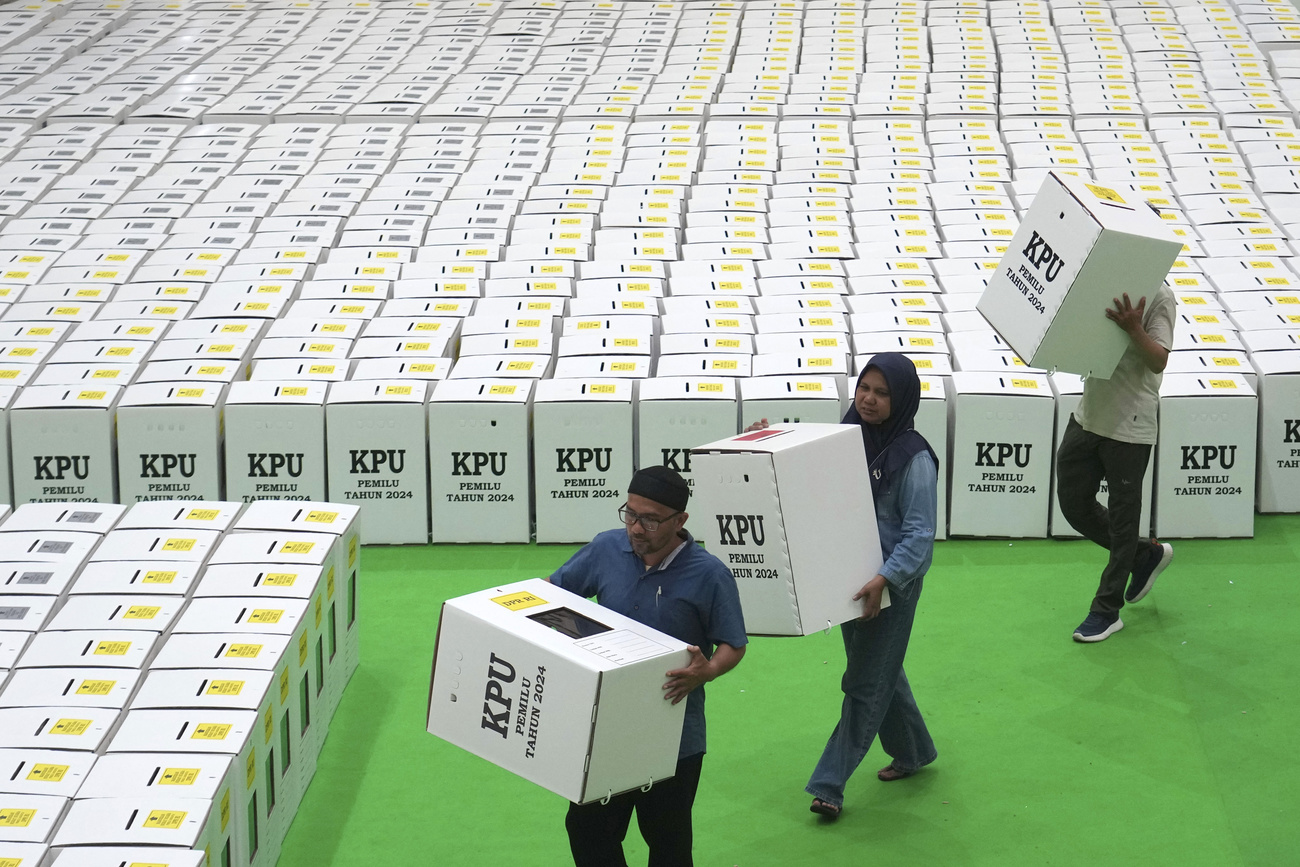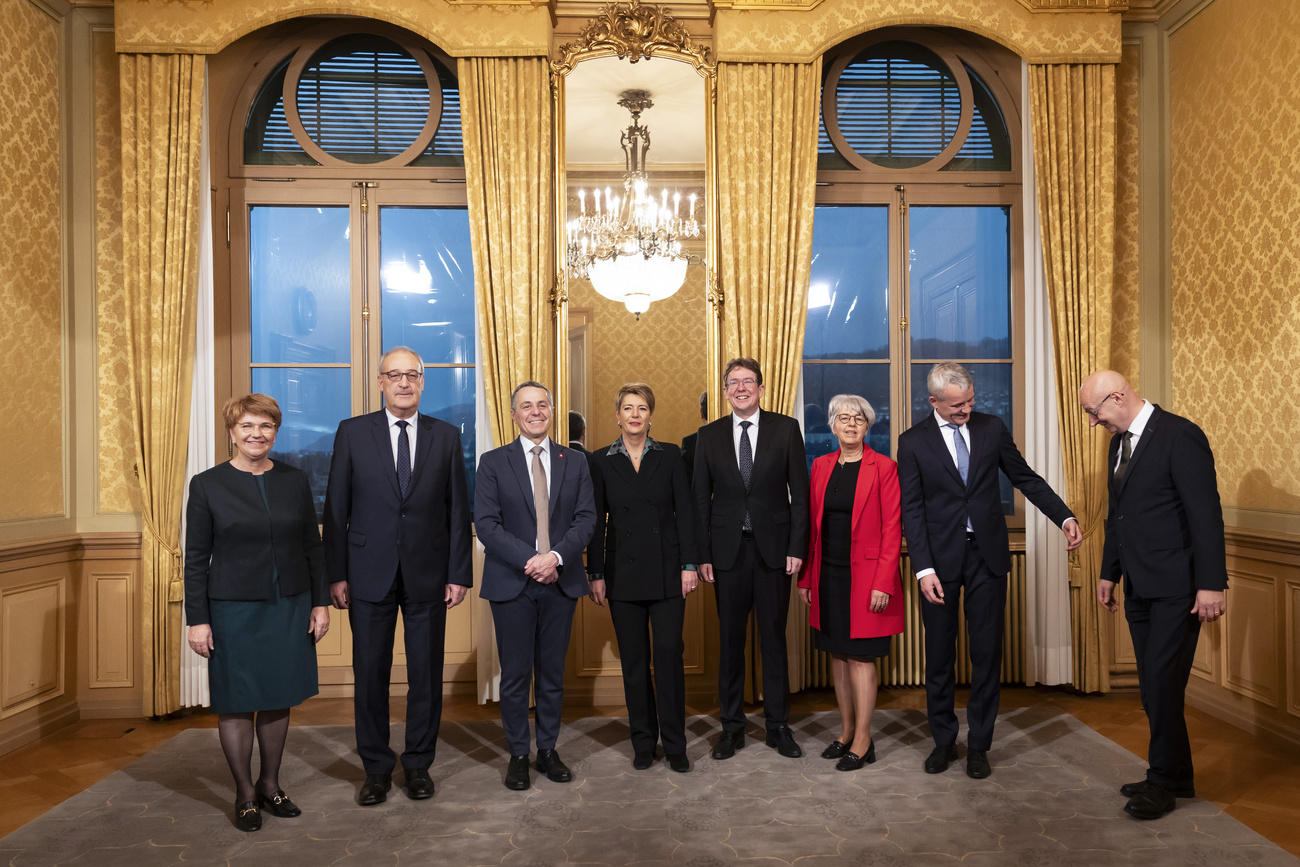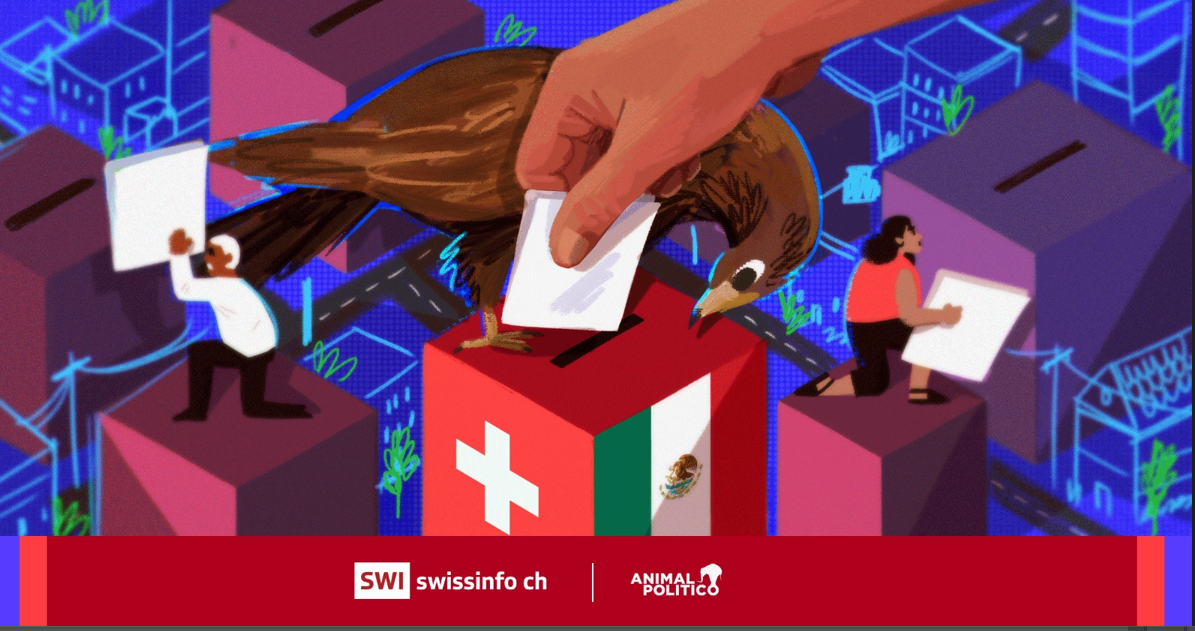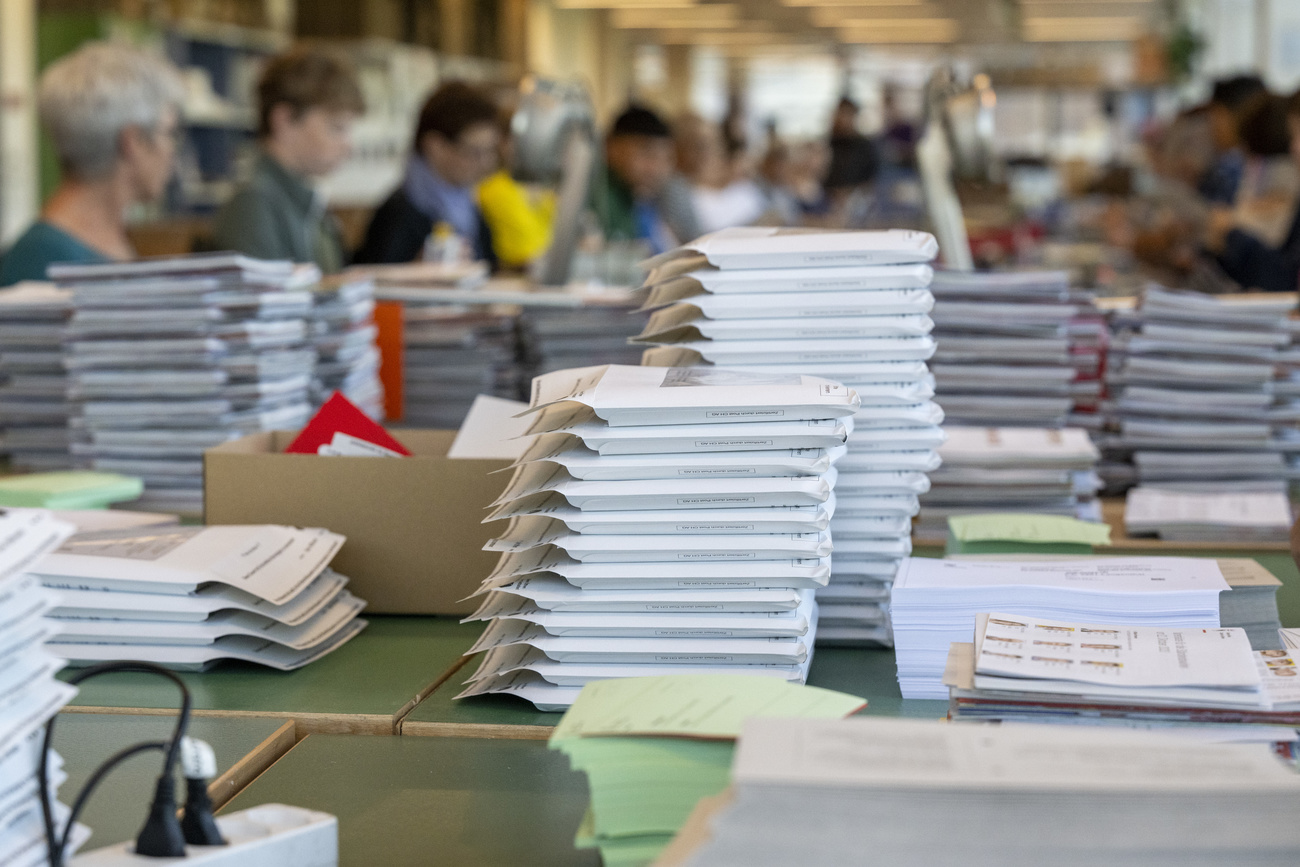Save the dates: a ‘year of democracy’

Some 4.5 billion people in almost 80 countries will decide the leadership of some of the world’s largest democracies this year. We look at some of the most significant elections and what the outcomes could mean for Switzerland.
More than twice as many people will be called to vote in 2024 than in 2023. Eight of the ten most populous countries in the world will hold elections. India alone is home to 1.4 billion people. In Pakistan, Indonesia, the United States, the 27 countries of the European Union, and (probably) Britain, hundreds of millions of people will be able to have their say in the next 12 months. The EconomistExternal link has called 2024 “the biggest election year in history”.
However, as British playwright Tom Stoppard once pointed out, “it’s not the voting that’s democracy, it’s the counting”. Many of the elections taking place are not free and fair and are highly unlikely to have a meaningful influence on governments. You don’t need to be an experienced Kremlinologist to predict that Vladimir Putin, this year celebrating 25 years at the top in Russia, will be re-elected in March.
Then there’s artificial intelligence. What roll will AI play in the various elections? What steps are governments and political parties taking? AI has already fabricated scandals on Swiss politicians.

More
2024 represents ‘critical juncture’ for future of democracy
But maybe it’s too soon to get too pessimistic about a democratic crisis. “For all its swagger, its sense of historical momentum, the autocratic world is nowhere near to reversing the losses that it suffered in the second half of the 20th century,” Janan Ganesh writes in the Financial TimesExternal link, providing some perspective. “Democracy is on a downward trajectory, no doubt, but so is a boxer who loses a round after winning six.”
January
January 13. Taiwan, home to 24 million people, is holding presidential and parliamentary elections. The outcome could shape how Chinese President Xi Jinping pursues his goal of taking control of what Beijing considers “sacred” Chinese territory. Switzerland, which doesn’t recognise Taiwan as a sovereign state, will continue to walk a fine line between promoting peace and democracy and not irritating China.
February
February 8. Pakistan (240 million people) is set to hold a general election (postponed from November).
February 14. Indonesia is holding presidential and legislative elections. Three candidates are vying to succeed incumbent President Joko Widodo, who is finishing up the maximum two terms allowed by the constitution. About 205 million of Indonesia’s more than 270 million people are eligible to vote and about a third of those are under the age of 30.
March
March 3. Voters in Switzerland will head to the polls on the first of four voting Sundays (the others are on June 9, September 22 and November 24). The two federal issues to be decided involve pension reform.

More
What lies ahead: The Swiss political landscape for 2024
March 15 (until March 17). In Russia (population 140 million), Vladimir Putin’s re-election as president seems assured after years of cracking down on political opposition. That means Russia’s war on Ukraine also looks set to continue, testing the patience of Kyiv’s main ally, the United States. Switzerland is set to continue implementing EU sanctions on Russia, but questions will no doubt continue to be asked about Swiss neutrality.
March 31. Municipal elections in Turkey (population 85 million). Can President Recep Tayyip Erdogan, narrowly re-elected in May, tighten his rule by winning back the cities he lost in 2019? Relations between Turkey and Switzerland have been better: Erdogan took exception to an effigy of him being burnt in Zurich last year, with the result that the Swiss ambassador in Ankara was summoned for an earful.
April
A general election will be held in India, the world’s most populous country, in April and May. Narendra Modi, another self-styled strongman, is sailing towards re-election as prime minister, having nurtured an uncompromising leadership style that plays well to many voters and foreign investors but riles human rights groups. If Modi’s Hindu nationalist party wins, the economy rather than rights is expected to remain his main focus.
The British prime minister, currently Rishi Sunak, must call a general election by January 28, 2025, but many pundits reckon it will be this spring or autumn. It will be the first nationwide election in the UK in which voters will have to show photo ID at the polling station. Will many people be turned away at voting booths?
May
May 11. The music might not be to everyone’s taste, but most people will acknowledge the technical – and democratic? – achievements in broadcasting the Eurovision Song Contest. Last year votes were gathered from 144 countries. This year’s final is coming from Malmö, Sweden.
May 31. Mexico (130 million people) is holding presidential and legislative elections (until June 2). As this SWI swissinfo.ch article explains, Mexicans have not forgotten the events that made them distrust the ballot box.

More
Voices of democracy in Mexico and Switzerland
A general election in South Africa, home to more than 60 million people, is due sometime between May and August. After three decades of government marred by graft and economic decline, the African National Congress (ANC) risks losing its parliamentary majority for the first time since Nelson Mandela led it to power in 1994 at the end of apartheid. If so, the ANC may need a coalition partner to stay in power – likely either the Democratic Alliance, popular with white voters, or the Economic Freedom Fighters, a Marxist party favoured by poor black voters. Either way, South African democracy will have turned a corner.
June
June 6. Elections to the European Parliament (until June 9). The EU’s 27 member states will elect the bloc’s next parliament. The EU is on track to receive over one million asylum applications this year – will it shift to the right, as the Swiss parliament did in October?
July
July 15. Rwanda (13 million people) is holding presidential and legislative elections. President Paul Kagame will seek to extend his roughly three decades in control of the East African country. He is eligible to continue in office for another decade, after a constitutional amendment in 2015 changed term limits.
September
September 15. UN International Day of Democracy. This year’s theme hasn’t been announced yet, but past themes have included stronger democracies, the importance of democracy for the 2030 Agenda for Sustainable Development, strengthening the voices of citizens, dialogue and inclusiveness, accountability, and political tolerance. To mark this day five years ago we published “Ten key ingredients for a democratic society”.
November
November 5. The big one. Voters in the United States (population 330 million) will elect their next president, as well as the entire House of Representatives and a third of the Senate. President Joe Biden is likely to face Donald Trump, the Republican front-runner, in a repeat of 2020. Trump is currently favourite, at least according to British bookmakersExternal link, but there’s a long way to go. The Financial Times, in its recent predictions for the yearExternal link, said it would be very close but Biden would “squeak through”. It warned, however, that “assuming the recent legal hurdles thrown up against Trump standing in Colorado and Maine are overcome, his campaign against Joe Biden will be the nastiest presidential election in US history”.
Unsurprisingly, International Geneva will be crossing its fingers for a Biden win. As president from 2016 to 2020, Trump displayed his contempt for multilateralism, casting a pall over the many international organisations in the Swiss city. At his instigation, the US withdrew from several bodies, including the Human Rights Council and the World Health Organization (WHO). The result was the rise of China, determined to take advantage of the vacuum left by Washington to put its stamp on the human rights system. Trump’s return to economic protectionism would also certainly be bad news for the World Trade Organization (WTO), whose arbitration system has remained paralysed since the Trump administration.
Washington watchers should also pencil March 4 in their diaries: that’s when Trump is set to go on trial for his alleged effort to overturn the 2020 election.

More
Peace, crises, Trump vs Biden: what awaits International Geneva in 2024?

In compliance with the JTI standards
More: SWI swissinfo.ch certified by the Journalism Trust Initiative











You can find an overview of ongoing debates with our journalists here . Please join us!
If you want to start a conversation about a topic raised in this article or want to report factual errors, email us at english@swissinfo.ch.